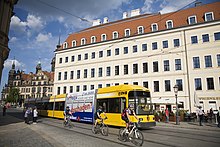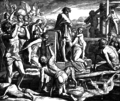
Back دەروازە:شارەکان CKB درگاه:شهرها Persian Wikipedia:Pooz/Städt KSH Portaal:Steden Dutch Cổng thông tin:Thành phố Vietnamese
The Cities Portal

A city is a human settlement of a notable size. The term "city" has different meanings around the world and in some places the settlement can be very small. Even where the term is limited to larger settlements, there is no universally agreed definition of the lower boundary for their size. In a more narrow sense, a city can be defined as a permanent and densely populated place with administratively defined boundaries whose members work primarily on non-agricultural tasks. Cities generally have extensive systems for housing, transportation, sanitation, utilities, land use, production of goods, and communication. Their density facilitates interaction between people, government organizations, and businesses, sometimes benefiting different parties in the process, such as improving the efficiency of goods and service distribution.
Historically, city dwellers have been a small proportion of humanity overall, but following two centuries of unprecedented and rapid urbanization, more than half of the world population now lives in cities, which has had profound consequences for global sustainability. Present-day cities usually form the core of larger metropolitan areas and urban areas—creating numerous commuters traveling toward city centres for employment, entertainment, and education. However, in a world of intensifying globalization, all cities are to varying degrees also connected globally beyond these regions. This increased influence means that cities also have significant influences on global issues, such as sustainable development, climate change, and global health. Because of these major influences on global issues, the international community has prioritized investment in sustainable cities through Sustainable Development Goal 11. Due to the efficiency of transportation and the smaller land consumption, dense cities hold the potential to have a smaller ecological footprint per inhabitant than more sparsely populated areas. Therefore, compact cities are often referred to as a crucial element in fighting climate change. However, this concentration can also have some significant negative consequences, such as forming urban heat islands, concentrating pollution, and stressing water supplies and other resources. (Full article...)
Selected city -

Giza (/ˈɡiːzə/; sometimes spelled Gizah, Gizeh, Geeza, Jiza; Arabic: الجيزة, romanized: al-Jīzah, pronounced [ald͡ʒiːzah], Egyptian Arabic: الجيزة el-Gīza [elˈgiːzæ]) is the third-largest city in Egypt by area after Cairo and Alexandria; and fourth-largest city in Africa by population after Kinshasa, Lagos, and Cairo. It is the capital of Giza Governorate with a total population of 4,872,448 in the 2017 census. It is located on the west bank of the Nile opposite central Cairo, and is a part of the Greater Cairo metropolis. Giza lies less than 30 km (18.64 mi) north of Memphis (Men-nefer, today the village of Mit Rahina), which was the capital city of the unified Egyptian state during the reign of pharaoh Narmer, roughly 3100 BC.
Giza is most famous as the location of the Giza Plateau, the site of some of the most impressive ancient monuments in the world, including a complex of ancient Egyptian royal mortuary and sacred structures, among which are the Great Sphinx, the Great Pyramid of Giza, and a number of other large pyramids and temples. Giza has always been a focal point in Egypt's history due to its location close to Memphis, the ancient pharaonic capital of the Old Kingdom. (Full article...)Did you know -
- ... that the founders of New York City's Circle in the Square Theatre had a total of $320 when they leased an inn in 1951?
- ... that Gloria Rojas, one of the first Latina broadcast journalists in New York City, helped launch the career of Geraldo Rivera?
- ... that before Foster City was built on Brewer Island, unsuccessful proposals included a hog farm, two military air bases, two civilian airports, and an entertainment complex larger than Disneyland?
- ... that the women's race at today's New York City Marathon will feature two of the medalists from this year's Olympic marathon?
- ... that a temple once housed the New York City Opera and New York City Ballet?
- ... that floods across New York City in September 2023 allowed a sea lion to escape her enclosure at the Central Park Zoo?
Related portals
Related WikiProjects
Elcor is a ghost town, or more properly, an extinct town, in the U.S. state of Minnesota that was inhabited between 1897 and 1956. It was built on the Mesabi Iron Range near the city of Gilbert in St. Louis County. Elcor was its own unincorporated community before it was abandoned and was never a neighborhood proper of the city of Gilbert. Not rating a figure in the national census, the people of Elcor were only generally considered to be citizens of Gilbert. The area where Elcor was located was annexed by Gilbert when its existing city boundaries were expanded after 1969.
In November 1890, the seven Merritt brothers discovered ore near Mountain Iron, triggering an unparalleled iron rush to the Mesabi Range. The Elba mine was opened in 1897, and the town was platted under the direction of Don H. Bacon, president of the Minnesota Iron Company. A second nearby mine, the Corsica, was opened in 1901. The community was first called "Elba" after the name of the first underground mine (the name "Elcor" was formed later by combining the first syllables of each mine's name). The Elba and Corsica mines were both leased by Pickands Mather and Company after the formation of the United States Steel Corporation. An influx of people of many ethnicities and many nations followed, and Elcor became a microcosm of U.S. immigration, mirroring the cultural assimilation of the time. At its peak around 1920, Elcor had two churches, a post office, a general store, a primary school, a railroad station, and its own law enforcement, and housed a population of nearly 1,000. (Full article...)Selected article -

A sustainable city, eco-city, or green city is a city designed with consideration for social, economic, environmental impact (commonly referred to as the triple bottom line), and resilient habitat for existing populations, without compromising the ability of future generations to experience the same. The UN Sustainable Development Goal 11 defines sustainable cities as those that are dedicated to achieving green sustainability, social sustainability and economic sustainability. They are committed to doing so by enabling opportunities for all through a design focused on inclusivity as well as maintaining a sustainable economic growth. The focus will also includes minimizing required inputs of energy, water, and food, and drastically reducing waste, output of heat, air pollution – CO2, methane, and water pollution. Richard Register, a visual artist, first coined the term ecocity in his 1987 book Ecocity Berkeley: Building Cities for a Healthy Future, where he offers innovative city planning solutions that would work anywhere. Other leading figures who envisioned sustainable cities are architect Paul F Downton, who later founded the company Ecopolis Pty Ltd, as well as authors Timothy Beatley and Steffen Lehmann, who have written extensively on the subject. The field of industrial ecology is sometimes used in planning these cities.
The UN Environment Programme calls out that most cities today are struggling with environmental degradation, traffic congestion, inadequate urban infrastructure, in addition to a lack of basic services, such as water supply, sanitation, and waste management. A sustainable city should promote economic growth and meet the basic needs of its inhabitants, while creating sustainable living conditions for all. Ideally, a sustainable city is one that creates an enduring way of life across the four domains of ecology, economics, politics, and culture. The European Investment Bank is assisting cities in the development of long-term strategies in fields including renewable transportation, energy efficiency, sustainable housing, education, and health care. The European Investment Bank has spent more than €150 billion in bettering cities over the last eight years. (Full article...)General images -
Topics
List articles
Subcategories
Associated Wikimedia
The following Wikimedia Foundation sister projects provide more on this subject:
-
Commons
Free media repository -
Wikibooks
Free textbooks and manuals -
Wikidata
Free knowledge base -
Wikinews
Free-content news -
Wikiquote
Collection of quotations -
Wikisource
Free-content library -
Wikiversity
Free learning tools -
Wiktionary
Dictionary and thesaurus
© MMXXIII Rich X Search. We shall prevail. All rights reserved. Rich X Search







































